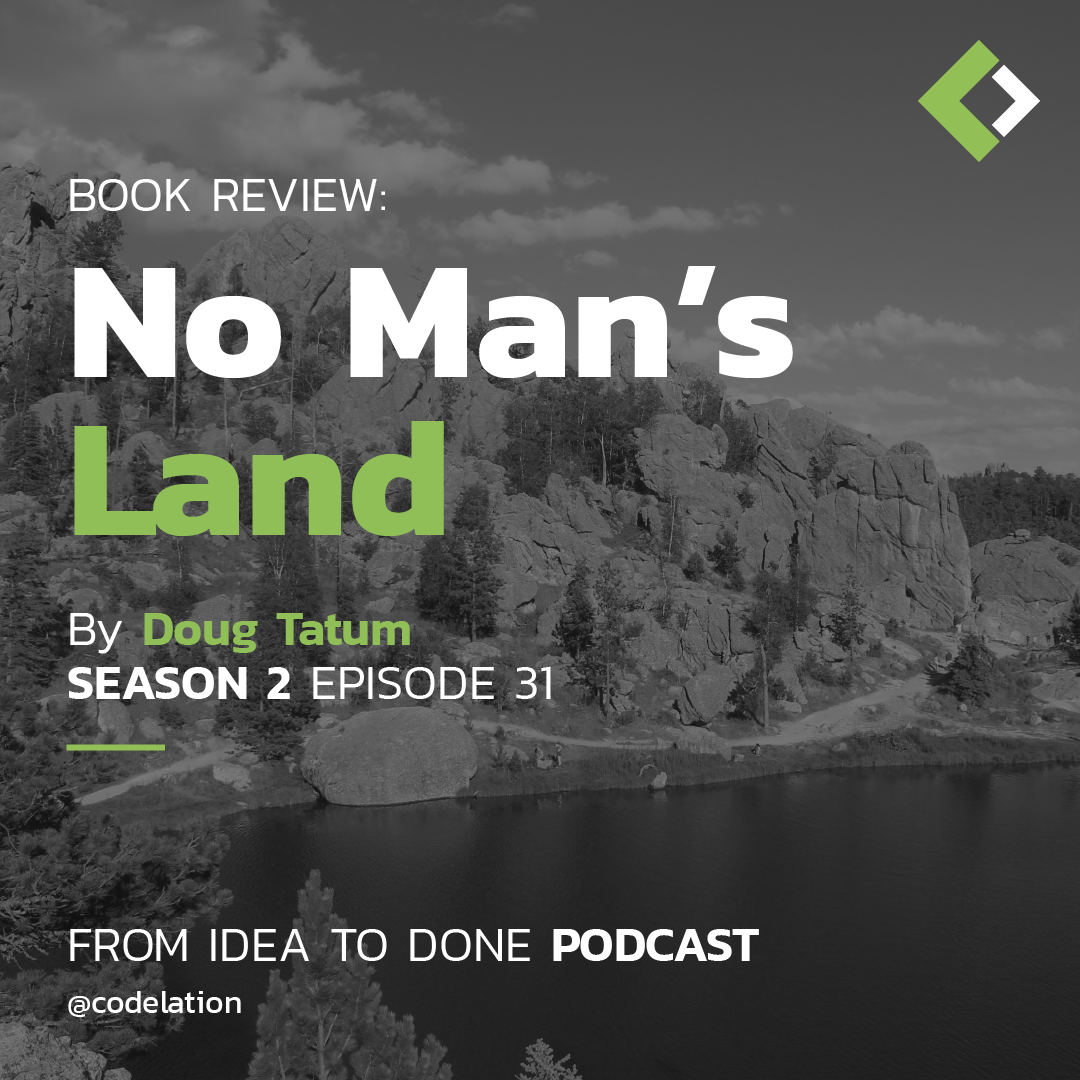Book Review: No Man’s Land By Doug Tatum
Software Review: Parallax Pt. 2 ft. Tom O’Neil
July 28, 2020
Book Review: Giftology by John Ruhlin Pt. 1
August 10, 2020VO: Get ready for your semi-regular dose of random ideas from the guys at Codelation. We like to talk about big ideas companies that are winning, and those that aren't along with current events in our crazy world of software startups. So come along with Erick and Josh, who challenge you to think big, start small and turn your ideas into something on this episode of, from idea to done
Josh: Hey everyone I'm Josh.
Erick: and I'm Erick and today's idea is the book review of No Man's Land: Where Growing Companies Fail by Doug Tatum. Josh, you referenced this book a couple of times in past episodes and you and I are kind of in the same where the two main recruiters for your growing company. Can you give us a little synopsis of this book?
Josh: Yes. Our growing company, but a no man's land, uh, helps you focus on a stage of growth that, you know, tough to see on, see on podcasts. We're not video, but it's a linear growth meaning kind of aligned from the left to the left bottom top right corner. And then expenses think of that almost as a stair-step to where you need more exp uh, you, you need more capital, more cash than you have, uh, when you are trying to scale the company.
Erick: And so you can do that without cutting your marketing team or budget is that, but on a positive note, it's really kind of like just having your marketing team crush it so that the dev team is over.
Josh: Yeah. I think to some extent, you know, looking at an expense like marketing, if you don't have the margin in your business, are you able to invest in it? And you know, that was something we did a year, year and a half ago is saying, you know, let's go all in and cart content and marketing and see where we can get it to, um, it was an expense, but I think we're on the other side seeing kind of the fruit of, of that happening and really at the core of it. Um, the, the book teaches you to focus on the, the M's, which is a market management money and model and how you grow. You really need to keep your eye on, on each one. Um, as a smaller company, what worked for you won't work as, as you're growing the, you know, the small company you can promise and pivot quicker. The co customer is able to have a very simple exchange with you as a company, but as you grow, everything becomes more complex and you can fall over, uh, out of alignment with the market, which may feel like everything is just starting to slow down or quality problems start to emerge.
Erick: And so that's kind of, it's easy to fix things when you're a team of two, it's a little trickier when you're a team of 10 where we're at now. And I can't imagine it getting easier as we grow 200 or 2000. All right. And so what are some of, kind of like the key things you, me, and kind of anyone listening can take to their growth strategy and kind of recruiting efforts to help them. So they don't fail.
Josh: I think there's takeaways from the book and this is kind of my, my spin or opinion on the book itself. Um, so one is to say, what is the unique value that we built our business on and continue to validate? Are we growing out of alignment with the market? Um, it's really easy to, to say that, um, as a startup, you are providing high value at low cost, but that's not a scalable thing. And so, you know, we've really focused in on the concept of idea to your first customer. And I think that's something that's, that's really aligning with the audience we're in front of, and it's, it's ours to, to mess up with lose that focus as, as we're growing. Sure. So, you know, if we can focus on that core value proposition and really develop processes around that, I think that's, that's where we win.
Josh: The second part of that is to say, what are the next steps and how can we really attract the best people we can to help us grow the team? If we can really focus in on the culture of the team and attract those that have done it before? I think it was a Susan Patel's episode of the podcast where he said, hire somebody that's done the task you need to do not once, but twice, first time could have been a fluke. Um, so I think that's a big thing is to focus on, you know, leveling up as a team and, and bringing people in that, uh, have seen little level of success before that maybe we haven't. And then finally, um, I'm looking at it from a standpoint of, we need metrics to provide stability and understanding of the road in front of us. Um, it's something I'm diving into is, uh, the concept of an OKR or KPIs. People are probably seeing them as, okay, ours are objectives and key results. Um, it's really tough to look back a year and say, how successful are we going to be in the future based on, you know, prior, prior performance.
Erick: And I think it's interesting kind of as we've grown, this is the first time in the past, I don't know, two months we've actually looked at listeners and we've looked at who this is actually talking to instead of focusing on just making the stuff. And it kind of gets into like my growth strategy, which is just kind of know people in our field that I like that would be interested in working for us, sell a bunch of things so we can hire them. And I don't like throwing things on indeed or looking for other recruiters to fill a hole that we didn't prepare for in those cases, both sides are kind of like desperate to change quickly, and that can kind of lead to one of us or if not, both of us making a bad choice in working together. And so I actually, I have two coffee meetings set up next week with people in our field that might want to work with us someday. What, is there any thought or strategy from the book that I should be taking into those meetings?
Josh: I think the two things that we can focus in on are momentum and culture. And, um, I think when culture done right, is that it helps provide the appearance of forward motion at all times. You know, even when you're struggling or there's issues or it's bumpy, the culture can help weather you through that. And that's not, you know, putting on a fake for a new year for the public to see. Um, but it, it gives the appearance of forward motion, even when you might be slowing down a little bit. It's, it's really the company self-esteem, if we're able to create a culture that others want to be part of, does that just galvanize, you know, everyone involved.
Erick: And I think there's, we've talked about this before, but momentum is so underrated. You know, if you're playing a game of football and you keep marching down the field and you're rocking and you know, you do a three and out in the middle of that, but you still have like crazy momentum and the crowded, like it does, the hardships don't really matter as much. And so
Josh: As a 300 pound man, when I fall down a flight of stairs, I don't stop. Yeah.
Erick: Yeah. Science. Any last additional thoughts on the book?
Josh: Uh, you know, there's a lot of really good takeaways from the book and we really just scratched the surface, um, in this talk. And all I can really say is that if you are running a business, this has to be on your reading list.
Erick: I like it. So thanks for reading this and telling me how to implement it into our work and make our team better. And that I don't have to then, cause you're, you're a human cliff note.
Josh: Oh boy. That's that's high school talk right there. Cliff notes. Huh? Um, you know, you, you can just Google stuff too, right.
Erick: As an app development company. Google. Fair enough. So yeah, tune into next episode where I don't read a book or Google it and ask Josh about the book Giftology by John Ruhlin.
Josh: Thanks for listening. We hope that you know of a startup that could use our advice and random thoughts, send them over to correlation.com to hear the next podcast.
Sign up to receive email updates
Enter your name and email address below and I'll send you periodic updates about the podcast.
